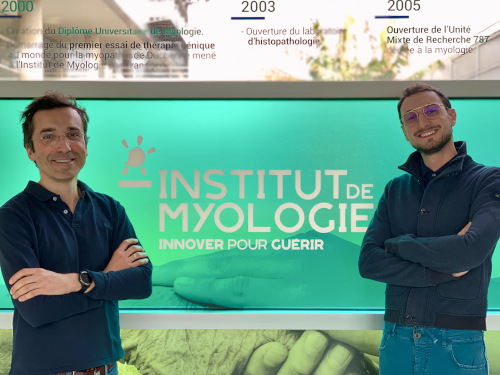
The European Commission has awarded Gabriele Ordazzo, a postdoctoral researcher supervised by Mario Gomes-Pereira (Repeat Expansions & Myotonic Dystrophy team – Gourdon Group), with the prestigious Marie Skłodowska-Curie Actions (MSCA) Individual Fellowship. He follows in the footsteps of Fiorella Grandi supervised by Piera Smeriglio (Biotherapies for motor neuron disorders team), who has been awarded the same fellowship last year.
The MSCA Postdoctoral Fellowship is aimed at Ph.D. holders seeking to conduct research abroad, enhance their skill set, and advance their careers. These grants encompass salaries and research-related expenses, facilitating activities such as training and networking, with a strong emphasis on mobility and collaboration.
Mario Gomes-Pereira and Gabriele Ordazzo
In the 2023 application cycle, the European Commission received 8,039 proposals, marking a 14% increase from the previous year. The European Commission selected 1,249 projects to support, resulting in a success rate of approximately 15%.
Gabriele Ordazzo’s project
RNA plays a key role in brain cell communication, and when its processing is disrupted, diseases like Myotonic Dystrophy type 1 (DM1) can occur. In DM1, toxic RNA clusters disrupt normal cell functions, but it is unclear which brain cells are most affected and how this interconnected network is altered in pathology. Using a mouse model generated in the lab, Gabriele will study the DM1 brain pathogenesis, aiming to better understand the mechanisms of toxic RNA repeats for a possible brain therapy and apply findings to similar diseases. This project will count on cutting edge technologies able to advance our understanding of RNA biology in the brain.
Gabriele Ordazzo shares insights into the motivations behind his application and his aspirations as he embark on this fellowship journey:
“For me, to be awarded the MSCA (Marie Skłodowska-Curie Actions) is a remarkable achievement. Moving abroad has provided me with the opportunity to connect with new scientists and wonderful people who believe in me and have encouraged me to embrace the challenge of writing a scientific project for the MSCA. This prestigious fellowship offers a platform to further develop my ideas and advance my project, which is centered around innovative techniques to unravel the pathology of DM1 from the brain perspective. My ultimate objective is to contribute a small yet meaningful part towards constructing a robust therapy for patients.”
